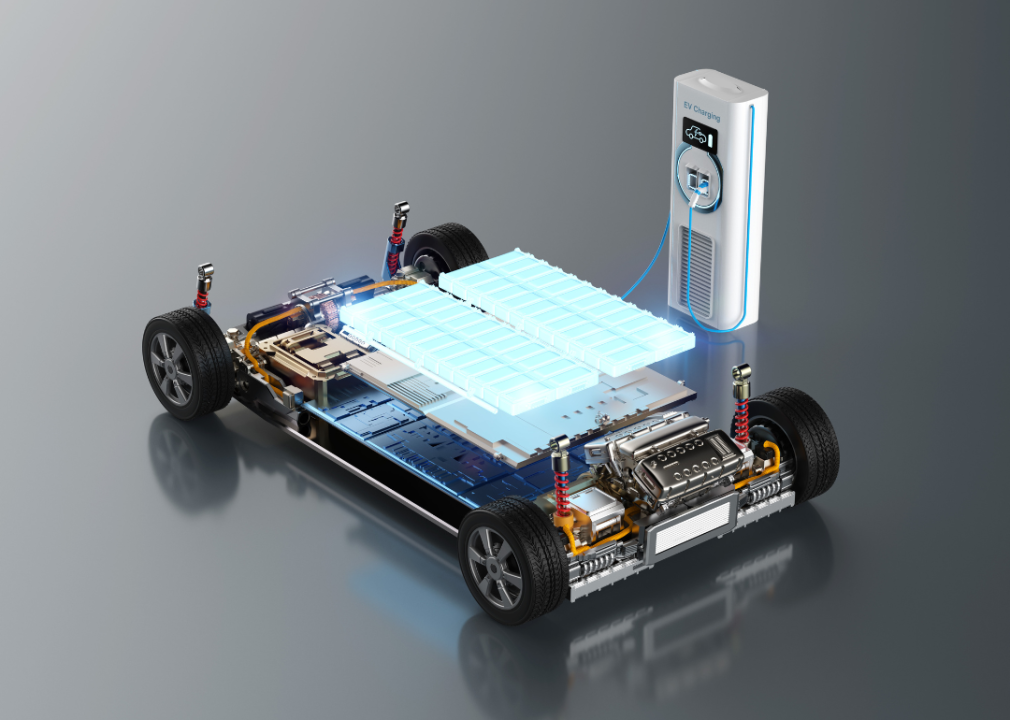The cost of an electric car battery replacement has more factors than you might think

Canva
The cost of an electric car battery replacement has more factors than you might think
An electric car battery hooked up to an EV charger; a conceptual image
While electric vehicles require less routine maintenance than fuel-burning vehicles, there’s one aspect of EV ownership that concerns prospective buyers: battery longevity. In fact, two of the most common questions we get from people considering an EV, whether used or new, are: “How long will the battery last and how much will it cost to replace the electric car’s battery?” They’re legitimate questions since the main battery of an electric car is one of the most important — and expensive — components. Knowing the average lifespan of an electric car’s battery and its replacement cost can help prospective EV owners make informed decisions and reduce some of the anxieties of a potentially massive service bill.
In this article, Edmunds covers the components that can affect an electric car’s battery replacement cost. We’ll start by discussing the average lifespan of an EV battery, list the factors that will affect its pricing, give tips on prolonging its lifespan, and briefly touch on a couple of alternatives to battery replacement.
Average cost of electric car battery replacement
There are several factors that determine the replacement cost of an electric car battery, including the make and model of the car, the size and capacity of the battery, market prices, and the cost of labor. The data at this time is limited, as only a small number of EV models have been on the market long enough to warrant a battery replacement. On average, you can expect the replacement cost of an electric car’s battery to run from $5,000 to upward of $15,000, according to an article from Consumer Reports. As a general rule, the larger the battery is, the more expensive it is to replace. If the electric car is still under its factory warranty, the replacement pack would be free to the customer. Here are more details about why an electric car battery’s replacement cost can vary so widely.
Make and model: Battery replacement cost is often directly correlated to the make and model of an EV. This is because less expensive electric cars, like the Nissan Leaf, tend to have smaller batteries and will therefore cost less to replace. Large, luxury or long-range electric vehicles like the Tesla Model S or Ford F-150 Lightning often have bigger batteries, which translates to higher replacement costs.
Battery pack type and capacity: Some automakers have designed their electric car battery packs with a modular design, meaning that some portions of the battery pack can be replaced without having to replace the whole thing. In these cases, an individual module can cost anywhere from $1,000 to upward of $3,000 depending on its size. Other automakers chose to use an integrated battery pack, meaning that if some cells in the battery fail, the entire battery will need to be replaced. In this scenario, you’d pay the full price of the battery pack.
Market conditions: For now, the majority of electric car batteries are made with rare earth metals, such as lithium, manganese and cobalt. These metals aren’t commonly available worldwide and are, therefore, subject to price fluctuations based on supply and demand. Upward swings in the prices of these materials will translate to a more expensive battery part cost.
Labor rates: While most of an electric car’s battery replacement costs go toward the parts themselves, it will still need a qualified mechanic to install them. Auto mechanics’ labor rates vary by city, state, and whether the technician works at a dealership or an independent shop. A ballpark figure for labor costs to replace an EV battery would be about $900 on the low end and upward of $2,000 on the high end.
Warranty coverage: Electric vehicles are federally mandated to have an eight-year or 100,000-mile (whichever comes first) warranty, covering the electric motor and the battery. Though battery cells degrade over time, the warranties also cover premature degradation, with each manufacturer stating the percentage threshold in its warranty. Tesla, for example, says that if the battery falls below 70% of its capacity before the warranty expires, it would replace the battery at no charge. For the Chevrolet Bolt, the battery threshold is 60%. The Nissan Leaf’s warranty is slightly different, in that it measures the battery in 12 “segments.” If the Leaf’s battery falls below nine “segments” while it is under warranty, it would qualify for a replacement. These are a few examples of electric car battery warranty coverage, but keep in mind that acceptable battery degradation levels can change from one year to the next. Also note that the manufacturer may not replace the pack with a brand-new one. In the case of the Bolt, for instance, “The battery will be replaced/repaired … with a battery appropriate for the age and mileage of the vehicle.” Check your warranty guide for information specific to that model.
![]()

Canva
Alternatives to electric car battery replacement
A person is placing an EV charge plug into the charge port of an electric car
Given the high prices for an EV battery replacement, it’s natural to wonder if there are alternatives. Here are a couple to consider.
Battery pack refurbishing: There are third-party companies that specialize in EV battery recycling and refurbishing. This can be a more cost-effective option compared to a battery replacement at the dealership. Unfortunately, these companies are fairly new and hard to vouch for. Plus, they may not carry batteries for all EV models. Make sure to research the company well and talk to your mechanic about the installation before placing an order for a refurbished battery.
Buy a new electric vehicle: This may sound obvious, but it is definitely something to consider. The older a vehicle gets, the less it’s worth. There will be scenarios in which a new EV battery will cost more than the vehicle’s value. On one hand, those costs might be cheaper than buying a new EV, but spending $15,000 on a new pack for a car that might be worth $10,000 is a tough sell.
Average lifespan of electric car batteries
Edmunds has a detailed story on how long an electric car’s battery will last, so we’ll only cover the highlights here. The lifespan of an electric car battery depends on several factors, including the battery’s chemistry, operating temperatures, charging habits, and the vehicle’s battery cooling system.
The U.S. Department of Energy has predictive modeling by the National Renewable Energy Laboratory that indicates that modern EV batteries can last 12 to 15 years in moderate climates, while those in extremely hot or cold climates can expect a lifespan in the eight- to 12-year range.
Batteries degrade over time, even when perfectly maintained, and degradation reduces their performance and capacity and thus range. Most electric car battery replacements are still a rarity due to recalls, according to Recurrent. As a result, most of the replacements so far have occurred while the vehicle was under warranty.
Ultimately, the decision to replace your EV’s battery comes down to when the battery has degraded to the point where it significantly impacts your daily commute or when the cost of repair is higher than the cost of replacement.
What is an electric car battery and how does it work?
Similar to the battery that powers your smartphone or the laptop you’re reading this on, most EVs on the road today use lithium-ion batteries. Hybrids and older electric vehicles use nickel-metal hydride (NiMH) batteries, which are less expensive and last longer, but — in the case of full EVs — take longer to charge. Either battery type will provide energy to power the electric motor. An EV battery pack typically consists of individual battery cells arranged in modules in a pack, with the modules connected in series and parallel to provide the necessary voltage and capacity. Our article on how EVs work goes into greater detail about how the battery integrates with the rest of the electric vehicle components.
Tips to prolong the lifespan of an electric car battery
If you want to ensure your electric vehicle’s battery lasts as long as possible, here are a few tips to ensure its longevity.
Avoid extreme temperatures: Extreme hot or cold temperatures can affect the performance and lifespan of an electric car battery. Try to park in shaded areas or ideally in a garage to keep it at a moderate temperature.
Minimize fast charging: Level 3 or DC fast charging are convenient ways to take a road trip in your EV or save you time, but this process generates a lot of heat and therefore takes a toll on the battery. Do the bulk of your charging at slower 240-volt stations and save the fast charging for special occasions.
Keep the battery in the sweet spot: The ideal operating range for EV batteries is about 20%-80%. Don’t make it a habit of driving the EV below 20% and, similarly, don’t charge to 100% every night. Both of these are hard on the battery and will shorten its lifespan. Modern EVs will allow you to set the maximum charge rate, so make sure you set it to 80%.
In summary
Replacing an electric car battery can be a significant expense, but by understanding the factors that affect its cost and lifespan, EV owners can make an educated decision before dropping tens of thousands on a new battery.
This story was produced by Edmunds and reviewed and distributed by Stacker Media.
